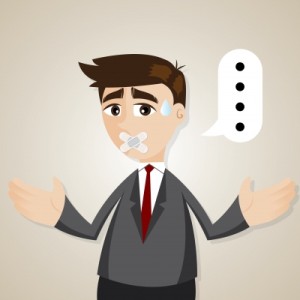
Image curtesy of FreeDigitalPhotos.net/iosphere
Cover your ears! We all – well, at least most of us, swear a little now and then. Some of us probably do a little more than others. But what happens when you utter a curse word in the courthouse? Can you be charged? Can you be held in contempt of court?
Recent Illinois Appellate Court Case: People v. Perez, 2014 IL App (3d) 120978 (2014).
The Illinois Appellate Court analyzed the issue when it reviewed an indirect criminal contempt case. The defendant was in traffic court waiting to appear for her speeding ticket. The court took a recess around 11:30 a.m., to which the defendant made the remark, outside the courtroom, “I waited all f***ing morning and now she takes a break.”
A courtroom deputy, who overheard the comment, related it to the judge who instructed the state to file a petition for contempt. The court denied defendant’s effort to continue the case for a short time, prohibiting defense from researching the issue, investigate potential witnesses, and answering the charge. The same judge presided over the defendant’s contempt hearing later that day. The judge found the defendant guilty of indirect criminal contempt and sentenced her to eight days in jail.
The defendant raised two issues on appeal: (1) she was not proved guilty of contempt beyond a reasonable doubt and (2) her constitutional right to procedural due process was violated by the trial court.
What is Direct/Indirect Criminal Contempt
Charges of criminal contempt arise from “conduct that is calculated to impede, embarrass, or obstruct the court in its administration of justice ….” Direct criminal contempt occurs when an individual commits a defiant or disrespectful verbal or nonverbal act which takes place in the courtroom and is witnessed by the judge. Indirect criminal contempt is based on conduct the court has not personally witnessed. Thus, indirect criminal contempt proceedings should not be adjudged in a summary proceeding initiated by the judge.
Problems with the Proceedings
The court found several procedural defects in the indirect criminal contempt proceedings, beginning with the name of the petition drafted by the prosecutor at the direction of the judge. Second, the court found the trial court’s denial of defendant’s request for a continuance denied the defendant of her right to due process. Third, the court found that because the courtroom deputy who overheard the comments told that information to the judge, the judge should have recused herself (she spoke with an eyewitness).
The Appellate Court’s Decision
The court reversed the defendant’s conviction finding there was not sufficient evidence to prove the defendant guilty of contempt beyond a reasonable doubt. The defendant did not use profanity when she referred to the judge, she used the profanity only when she was referring to how long she had been there. The court went so far as to find “these remarks about the additional delay resulting from the recess my constitute protected speech under the first amendment.”
Takeaway
What can we take away from this bizarre legal proceeding? Don’t swear in the courthouse. And, if you must, make sure no one can hear you and don’t ever direct it towards the judge – or any courthouse staff for that matter!

